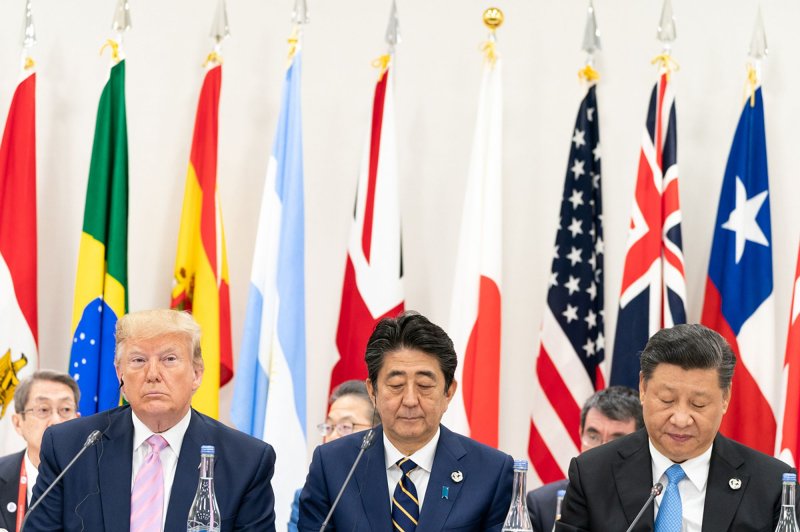President Donald J. Trump, seated next to Japanese Prime Minister Shinzo Abe, listens as China’s President Xi Jinping (right) delivers remarks at the G20 Leaders Special Event on the Digital Economy at the G20 Japan Summit on Saturday, in Osaka, Japan. Photo by Shealah Craighead/White House/UPI |
License Photo
June 29 (UPI) -- President Donald Trump agreed to halt more China tariffs after the G20 summit in Japan, but disagreed with the rest of the group on the climate change fight.
Trump has agreed to halt new tariffs on around $350 billion in Chinese imports in exchange for China agreeing to increase its purchase of U.S. agricultural products.
"We're holding on tariffs, and they're going to buy farm product," Trump said at a one-hour news conference after an 80-minute meeting with Chinese President Xi Jinping on the sidelines of the Group of 20 summit in Osaka, Japan. "We have, I guess, $350 billion left, which could be taxed or it could be tariffed. And we're not doing that. We're going to work with China on where we left off, to see if we can make a deal."
Both countries also agreed to restart trade talks.
"China and United States both benefit from cooperation and lose in a confrontation," Xi told reporters through an interpreter.
Still, the halt on new tariffs does not impact the tariffs which have already been imposed.
About $250 billion worth of U.S. imports from China are already subject to tariffs of either 10 percent or 25 percent, according to a study by the Trade Partnership Consultancy, which also found the tariff battle could cost the United States one million jobs.
The United States is trying to broker a trade deal with China that offers more protection for intellectual property and prevents the forced transfer American technological know-how, NPR reported.
The annual meeting, which includes 19 countries and the European Union, addressed other issues impacting the global economy such as corruption, women's education, migration, innovation, global health and environmental issues like climate change.
On climate change, Trump stood out with his firm stance against the Paris climate accord.
The United States remains the only opponent to the Paris agreement out of the 20, but an 'agree to disagree' compromise allowed leaders to put forward a declaration to commit to fight climate change. The G20 leaders used a similar compromise framework in previous G20s since Trump was elected.
The text of the declaration on climate change remains similar to previous declarations in Buenos Aires and Hamburg, Germany, German Chancellor Angela Merkel said at a news conference at the end of the summit.
"We've succeeded after days and nights of negotiations to have again, after all, a 19 to 1 declaration, where the 19 signatory countries of the Paris agreement commit to the same thing as we did in Buenos Aires," Merkel said. "We say this this process is 'irreversible' and we say that we have made our commitments [to cut greenhouse gas emissions] and will do a review again in 2020 to see whether we must make new commitments."
Traditionally, the G20 summit has issued a statement against trade protectionism, but stopped short of denouncing it since the United States has imposed tariffs. G20 leaders made a "clear commitment to free, fair, non-discriminatory, transparent trade," instead of issuing such a statement.















